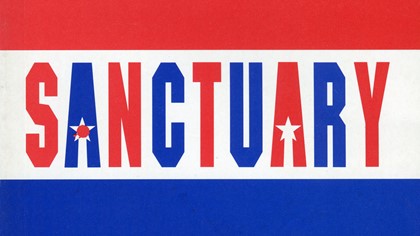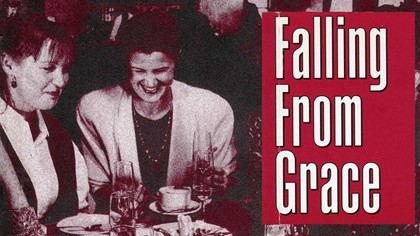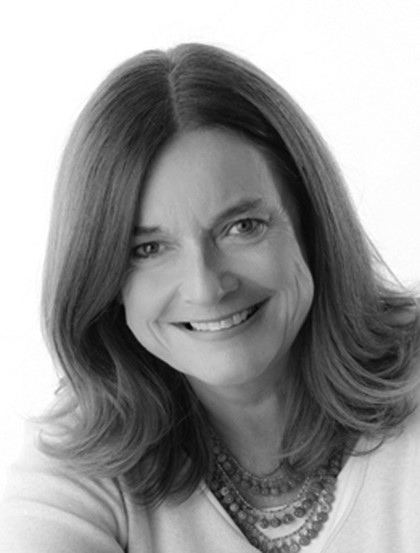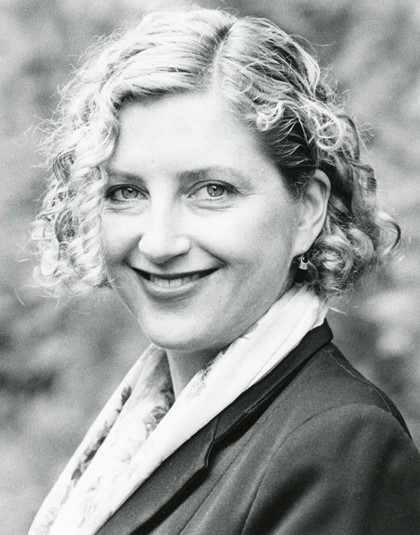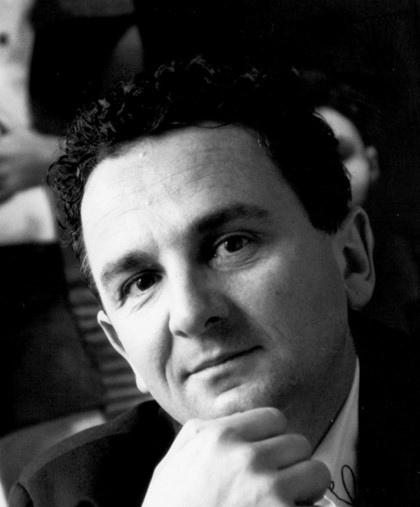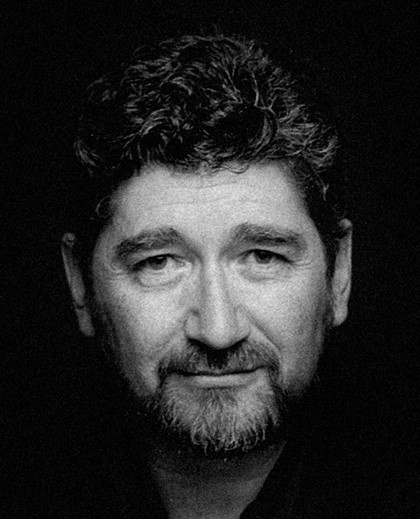At the start of the 1990s Playbox opened its iconic new home in the renovated CUB Malthouse in South Melbourne. With the exit of founding Artistic Director Carrillo Gantner, the company appointed Aubrey Mellor as his replacement and Mellor would guide the company through the difficult transition back into a permanent theatre as well as overseeing the further development of the building and the cultural precinct surrounding it, a task that was complicated by the impacts of architectural and landscaping transformation of the neighbourhood. During Mellor’s years as Artistic Director, Playbox championed new Australian writing and established important partnerships with independent companies, particularly the Aboriginal and Torres Strait Islander theatre collective, Ilbijerri.
Mellor had been a rising star of the final years of the New Wave theatre companies in Australia. He had worked as the Artistic Director of the Jane Street Theatre for the National Institute of Dramatic Arts (NIDA) and Co-Artistic Director of the Nimrod Theatre Company, and then as Artistic Director of Queensland Theatre Company. Mellor had also been an important part of Playbox’s relaunch prior to his appointment. He had directed Hannie Rayson’s Hotel Sorrento as part of the 1990 relaunch season at The Malthouse, which would go on to tour the ACT, New South Wales and Queensland, and become a major motion picture.
Mellor shared Gantner’s passions for new Australian work as well as continuing engagement with theatre companies in the Asia Pacific region. He also had a keen interest in showcasing and developing work by Australian Indigenous theatre makers. Mellor recalls that he grew up around the Aboriginal communities in Queensland, telling On Stage Magazine, 'I was in a different position to most people who grew up in cities. My dad worked on the film Jedda and I grew up with and had Aboriginal friends. I worked with Bob Maza in the foundation of Black Theatre in Sydney.' Mellor’s determination to help bring Indigenous Australian stories to the stage was also reflected in his work as Artistic Director of the Queensland Theatre Company. Mellor recalls how this work included:
'a devised work under direction of Janet Robertson, a physical theatre person whom I had appointed to head up Brolga, the TIE team of QTC that toured Queensland. I had asked Janet to devise a new work based on the life and poetry of the famous Moreton Bay Queenslander I knew as Aunty Kath, Oodgeroo Noonuccal, earlier known as Kath Walker and already in our schoolbooks when I was a child. It proved a beautiful production… One Woman's Song.'
At the time of Mellor’s appointment as the new Artistic Director at Playbox, the company had been committed to a policy of programming all Australian new works. The Board Chair at the time, Graham Samuel, wrote in a 1993 application to the Australia Council, describing the vital need for support of this policy, that :
'It is quite possible to operate commercially without an ongoing commitment to develop an Australian perspective, without social and artistic concerns, and without an ongoing commitment to Australian theatre workers.
However, it is not possible to commercially operate a complex infrastructure comprised of varying levels of developing skills and maintain a philosophy which has its main eye on the future and its hands full of foundation material. A visionary company costs money and, in other countries of the world, attracts money.
At this crucial time in the nations growth, it becomes more important than ever to maintain, against criticism and possible failure, the absolute necessity of developing Australia so that by the centenary of Federation our stages can at last be dominated by our own dramatic material.'
Mellor wrote at length about the company’s commitment to new Australian work in a national context, noting that:
Australia is still one of the few nations of the world whose stages are not dominated by its own culture. The performance of a new Australian play is no longer a novel event and audience response to it should never again be solely out of curiosity nor nationalism. It must be accepted as a natural feature of Australian life.
As we move out of the twentieth century it seem of enormous importance the Playbox’s voice be heard loud and strong; the nation must eradicate all vestiges of the colonial approach to the arts and everything that seemed elitist, imported and 'superior'. Not only should our lives and times, and our own view of both home and abroad, be proclaimed on our stages such should also be seen as normal and desirable for a healthy nation.
With Mellor’s transition to the position of Artistic Director at Playbox in 1994, he inherited not just a theatre company with a singular vision for Australian theatre, but also a major venue, and one that would have ongoing structural issues. The State Government had just announced plans for the construction of the Domain Tunnel directly under the Arts Precinct. Vibrations from the excavation would cause significant structural damage to the Malthouse, as well as loss of access to Sturt Street, the major front facing street access point to the venue. Car parking for the venue would also be impacted, forcing patrons to park further away at the VCA, the Victorian Arts Centre, or private parking at commercial rates. Disruptions from the development were estimated to affect the company for the next five years, and had a measurable impact on subscriptions and box office sales.
As well as negotiating these issues in his first year Mellor directed Sanctuary, a new play by David Williamson, as well as Hannie Rayson’s Falling from Grace which then toured regional Victoria and Tasmania. This year the company also staged Picasso at the Lapin Agile, a new play by American Comedian Steve Martin, which had been workshopped with the company the year previous. Mellor also took over the Theatre in the Raw play readings program, which had been established by Malcolm Robertson during Carrillo Gantner’s time as Artistic Director. In 1994 Theatre in the Raw was being overseen by playwright Michael Gurr who was keen to hand on the project to pursue his burgeoning playwrighting career and also his work as speech writer for the Labor Party. Speaking to Jasna Novaković, Mellor recalls that:
'The actors got together in the day and read the chosen play and in early evening would read the play (before an audience), usually seated on chairs, though later, standing with script on music stands. There were no programmes, no special lights, just actors on daily pay reading in the large rehearsal room, followed by a discussion.’
During the 1990s the relationship between Playbox and publishing house Currency Press, which began as early as 1985 with the publication of Louis Nowra’s The Golden Age, grew into a regular series. Currency committed to publishing each play programmed as part of the main season from 1990, starting with Hannie Rayson’s Hotel Sorrento and Tel Lyssiotis’ The Forty Lounge Café, to very nearly the end of the policy in 2004, with the final plays of this series being Andrew Bovell’s Speaking in Tongues and Matt Cameron’s Ruby Moon in 2003. The plays were published along with the production program, variously including notes from the director and writer as well as cast and crew credits.
In 1995 Mellor began discussions with a Japanese delegation regarding a collaboration for productions of The Head of Mary, a new contemporary Japanese play by Tanaka Chikao, alongside a Japanese translation of John Romeril’s The Floating World directed by Makoto Soto. Mellor directed both these works. The Floating World opened on the 24th of September in The Small Theatre of the Tokyo International Arts Space and was produced in partnership with Hirano and The Black Tent Theatre Company as part of the Tokyo International Festival. It was followed by The Head of Mary, for which Mellor would win the Uchimura prize for direction. Both productions were presented in Melbourne that year as part of the Melbourne International Festival of the Arts.
Mellor described his second year with the company in his Artistic Evaluation of the years’ work, writing:
'After a deliberately popular season in 1994, the second year of my Artistic Directorship explored more challenging material, aiming to gauge audience and critical responses. Subscriptions remained high for the year, though single ticket buyers were more daunted by some of the writing programmed. Melbourne audiences are, on the whole. More conservative than I had realised and unfortunately the print media is not as positive with new work as their colleagues in other states.
'After the 1995 season I remain convinced about Melbourne’s’ status as the theatre capital of Australia...'
In 1996 Emma: Celebrazione! by Graham Pitts opened in the Merlyn in February and drew in an impressive $161,000 in box office receipts. Michael Gow’s Good Works toured to the Wharf 2 Theatre in Sydney, and The Black Sequin Dress, a significant work written and directed by Jenny Kemp, premiered at the Scott Theatre in Adelaide as part of the Adelaide Festival in March.
In the same year, Playbox also launched a partnership with Ilbijerri Theatre Company alongside Playbox’s Indigenous Playwrights Program, establishing a relationship between the two companies that would first bear fruit in 1997 with a remounted production of Ilbijerri’s first show, Up the Road by John Harding, presented in the Merlyn. The writers program also helped to develop Jane Harrison’s landmark work Stolen, which became a co-production with Ilbijerri for the 1998 Melbourne International Festival of the Arts, directed by Wesley Enoch. Stolen told the stories of the Stolen Generations of Aboriginal children and their forced separation from their families by government fiat. With the release of the Bringing Them Home report, Stolen had a powerful impact on the audiences and the wider community, and would be remounted and toured for many years.
In 1997 the State Government confirmed that $6.4 Million was being allocated over three years in the state’s budget to the Malthouse Plaza project, expanding the city’s Arts Precinct further into Southbank and building new permanent homes for the Australian Centre for Contemporary Art (ACCA) and contemporary dance company Chunky Move. The development and construction on this site, though ultimately a benefit to both the city and Playbox, would in the short-term compound the toll being taken on subscriptions and attendance.
Internally the company was still dealing with organisational and administrative issues, and it was ascertained that company wages were not in line with guaranteed award and so had to be raised. The MEAA agreed to allow the company a two-year period of grace in which to introduce the new pay structures. The Playbox Statement of Strategic Direction for 1997, reaffirmed its commitment to making Playbox the 'pre-eminent company producing quality Australian drama using Australian writers, actors, directors and other creative talents.' It also noted the heavy toll taken on Playbox staff in working under less than desirable conditions due to the ongoing impact of the Tower renovations as well as the roadworks around and underneath the building, noting that:
"…given the heavy demands on a small staff of running both the Playbox Theatre Centre and the Malthouse Theatre complex, exacerbated by the difficulties associated with the City Link project and the Front Tower restoration, and in light of the additional work involved in the development o the Malthouse Plaza Project, the board resolves:
-
- to intensify its efforts to secure additional funding for Playbox from all available sources, recognising that the constraints upon Federal Government spending mean that further funding is unlikely through the Australia Council; and
- to review the current administrative and management structure of Playbox and Malthouse, including the Board and its Committees, to ensure that resources are deployed as effectively as possible to take both companies through the present difficulties to the next growth and development phase."
The following year opened with the launch of the Kiln restaurant situated in the West Tower. This year also saw Monash University’s sudden decision to cease its affiliation with Playbox at the end of the following year despite a nearly ten-year association between the two organisations. This was due in part to a change in university administration beginning with the appointment of a new Vice Chancellor in 1997. Nevertheless, Playbox immediately began discussions with other universities in the city and would eventually strike up a similar arrangement with the Victorian University of Technology.
1999 was a year seen by many as one of generational change in the performing arts. Simon Phillips replaced Roger Hodgman as Artistic Director of the MTC. Robyn Nevin replaced Wayne Harrison as Artistic Director of STC. Michael Gow became the new Artistic Director of QTC, and Rodney Fisher annoucned he would not be renewing his contract as Artistic Director of STCSA. Meanwhile Playbox had made their submission to the Inquiry into the Major Performing Arts Organisations (the ‘Nugent Inquiry’) to be included as one of the Major Companies and was now waiting on confirmation. This report to government would result in a major restructure of Federal funding for the arts and the establishment of the Major Performing Arts Organisations Board at the Australia Council dedicated to supporting thirty or so State Companies and large-scale cultural institutions.
Elizabeth Coleman’s Secret Bridesmaid’s Business opened in 1999 to enormous popular acclaim and would go on to sell out seasons, remounts, and national tours. Mellor writes of the 1999 season in his Artistic Evaluation report for the year:
'Thanks primarily to two women playwrights, Playbox has had one of its most successful years to date – with the first and last plays of our seasons being both critically acclaimed and popular at the box office. Secret Bridesmaids Business proved a best seller and Nightfall another box office and artistic success. In the centre of our year Stolen (by another woman playwright) had a successful return season and tour… these works are the result of active and positive discrimination to redress an historic and long-standing imbalance.'
Playbox also produced the stunningly ambitious landmark production of Tim Winton’s Cloudstreet, adapted from the novel by Nick Enright and Justin Monjo. This production was noted at the time for its length (over five hours long including a dinner break with meals served to the audience) and also its popularity, charting a generational story of two Australian families–the Pickles and the Lambs–struggling through the post-war years into the early 1960s.
Despite its successes, the early 2000’s would be a time of mounting pressure and criticism for Playbox. The company’s ongoing commitment to develop and stage exclusively new Australian plays was increasingly being seen as parochial in an arts environment, driven by state and federal government policy, as well as generational change in the independent theatre communities, that was geared towards producing works of international excellence and Australian companies developing an international reputation. This was coupled with the pressure of regularly producing a full season of eight to twelve new works every year which was being criticised for resulting in insufficient development times, the programming of unfinished scripts leading to the staging of unpolished productions.
Katrina Strickland reflected in the Australian that 'It is hard to put a finger on what hasn’t worked at Playbox in recent years. Some point to the wrong choice of plays, others to staging them before they were ready, still others to the inherent difficulty of finding 12 good new works each year.'
To combat this in 2000 the company launched a new development strategy, the Inside seasons. The Inside seasons grew from the Theatre in the Raw development program and presented short runs, no more than a week or two long, of new works in development, packaged as an adjunct to the main season. The Inside 2000 & 2001 season showcased works by Campion Decent, Margaret Cameron, and Angus Cerini. For 2002 the Inside season was renamed Blak Inside, and focus on new works by First Nations playwrights in collaboration with Ilbijerri. It included works by John Harding, Tammy Anderson, Tracey Rigney, Richard Frankland, Jadah Milroy and Maryanne Sam.
Despite some financial and programming strains, 2001 was a strong year artistically for Playbox. The company produced John Romeril’s Miss Tanaka in partnership with legendary Australian puppet theatre company, Handspan, which exceeded its expected box office by $20,000. Also this year Mellor directed Your Dreaming: The Prime Minister's Cultural Convention, written by Anthony Watt and Guy Rundle, and performed by Max Gillies, as part of the Melbourne International Festival of the Arts. Your Dreaming then went on to tour extensively throughout Australia for 2001 and into 2002. Tammy Anderson’s I Don’t Wanna Play House premiered, as well as St Kilda Tales by Raimondo Cortese, and Holy Day by Andrew Bovell in August.
2001 also began the process of updating the administration and managements computer equipment. To this point staff in the office were still using fax machines in some instances.
In June 2002 the Board accepted a revised vision statement for the company, specifically including a focus on international recognition:
'The new vision for the company is that by 2010 Playbox will be recognised nationally and internationally as the pre-eminent centre for innovative Australian Theatre. The purpose of the company is to be developing, producing, and promoting a uniquely Australian theatre, by engaging artists and audiences in a theatre experience that is fresh, provocative and entertaining. The core values of the company are New and Australian works that are accessible and relevant, nurturing and honouring, challenging and fun.'
But by the end of 2002 the board were expressing concerns over the recent downturn in subscribers. There were a range of reasons for this downturn, including the ongoing impact of construction and development in the area putting a strain on administration and making access difficult, and changes to government funding structures with the transition to Major Company status, but ultimately these factors only amplified the central problem the company faced: the inflexibility built into an annual season of all new works and the need to commit to productions before scripts were finished.
The following year, 2003, Mellor announced his intent to step down as Artistic Director at the end of 2004 and the board began the search for his replacement.
In this time, the company remained heavily engaged in regional tours, particularly Mavis Goes to Timor, a coproduction with Deckchair theatre by Angela Chaplin, Kavisha Mazzella and Katherine Thomson, and also Tammy Anderson’s I Don’t Wanna Play House. At The Malthouse, Playbox produced Stephen Sewell’s Myth, Propaganda and Disaster in Nazi Germany and Contemporary America, Ben Ellis’ Falling Petals, and Yanagai! Yanagai!, written and directed by Andrea James. The final Inside season, Inside 03: The Technology Project, opened as part of the Melbourne International Arts Festival and presented three works exploring the innovative application of technology to performance including a new dance work in collaboration with Vitalstatistix.
Before leaving the company, Mellor and the Board discussed the constraints associated with an eight- play new works season. The company needed to have greater flexibility in programming to allow time for development of works, quick response to new work, touring funding decisions, cash flow implications, marketing implications and venue planning issues. It was resolved that the 2004 season would still be an eight-play season, but may include umbrellaed productions, and that the company should seek support to underwrite a transition to rolling seasons of four or five plays.
In May of 2004 the Board appointed Michael Kantor to succeed Mellor as Artistic Director. That year, Mellor directed his final shows for Playbox, Anthony Crowley’s The Frail Man and Guy Rundle’s The Big Con, performed by Max Gillies and Eddie Perfect.
Playbox’s close focus on Australian plays and the partnership with Currency Press was a key factor in the national and international success of some of Australia’s now best-known playwrights. As Tom Healey wrote for Australian Plays, introducing their Playbox collection:
'The policy of the new Playbox was that it would produce not only almost exclusively Australian work (with some contemporary Asian content), but also that these works would almost all be world premieres. It was a heady vision. And for fifteen years, that is what it did. As a result, Playbox developed many brilliant voices.'
During Mellor’s years as Artistic Director Playbox championed the work of playwrights such as Hannie Rayson, Daniel Keene, Joanna Murray Smith, Louis Nowra, Stephen Sewell and Andrew Bovell. While all these writers had been emerging artists from the late seventies and throughout the eighties, the dedicated support and regular programming by Playbox and the wide availability of their texts published by Currency saw their work became recognised nationally and internationally.
Rayson and Bovell’s work has been turned into major Australian films – such as Hotel Sorento - and lauded Hollywood productions – such as Lantana. Murray-Smith has subsequently had a very successful career writing new works for the state flagship companies as well as a series of very successful productions, such as Honour, The Female of the Species and Songs for Nobodies in the UK and America, Sewell’s work has been programmed internationally such as It Just Stopped and The Secret Death of Salvador Dali, beloved plays by Nowra such as Cosi and The Golden Age are regularly revived by local and national theatre companies and works by Daniel Keene has had over eighty of his works performed throughout Europe and was appointed to the rank of Chevalier de I’Ordre des Arts et des Lettres by the French Ministry of Culture.
After leaving Playbox, Mellor was first appointed as Director of the National Institute of Dramatic Art (NIDA) where he succeeded John Clark who had been in the role for nearly forty years. Mellor only stayed at NIDA for three years, leaving in 2007 to take up the position of Dean of the Performing Arts Schools at Lasalle in Singapore.
Mellor was awarded an OAM for services to the performing arts in 1992.
Dr . Robert Reid is an independent playwright, theatre historian, immersive performance designer and critic. They were the artistic director of independent theatre company Theatre in Decay and immersive performance and game company, Pop Up Playground. Dr . Rob's plays have been performed by the MTC and Black Swan, and their immersive works have been presented by the MSO, SLV, City of Melbourne, Bell Shakespeare and the Melbourne Football Club. Dr. Rob has a PhD in Australian Theatre History, was a co-founder and co-editor of WitnessPerformance.com and now runs the YouTube channel, Television is Furniture presenting reviews, history and analysis of contemporary Australian theatre.
